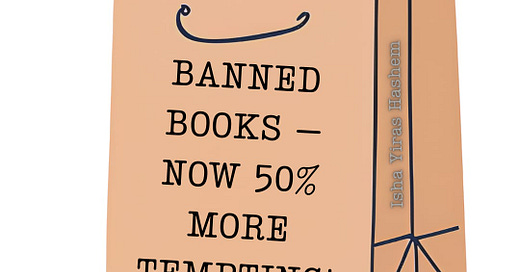Español: Un Pueblo, Dos Mundos: Necesitamos Prohibir Más Libros Como Este
Nothing makes a teenager want to read a book quite like banning it. When I learned that "One People, Two Worlds" was forbidden to Orthodox Jewish readers, I did what any self-respecting teenager would do: I marched straight to the public library and checked it out. It sounded fascinating.
Perhaps G-d engineered the ban knowing it would draw quirky contrarians like myself to this controversial book. Thankfully, this act of teenage rebellion ultimately strengthened both my faith and my self-confidence.
About This Book
The idea seemed simple: take two rabbis—one Reform, one Orthodox—and let them debate their differences through email. Reform Rabbi Ammiel Hirsch in one corner, Orthodox Rabbi Yosef Reinman in the other, with a moderator keeping the discussion civil. What could have been just another theological debate turned into something more: a guidebook for questioning minds. I doubt I'm the only rebellious teenager who, in seeking to challenge authority, accidentally found answers instead.
Relevance in a Fragmented World
The debates over religious authority, gender roles, secularism, and Israel haven't softened—they've calcified. These days, people with different viewpoints are about as likely to have a real conversation as online debaters are to admit they might be wrong.
One People, Two Worlds was published in 2002, and countless books on religion have appeared since then. Yet I keep returning to this one. In a world of shallow takes, shouted opinions and trolling, this book offers something precious and rare: an intense but respectful conversation about what divides and unites us.
For me, reading their exchange felt like eavesdropping on a familiar family debate. Coming from a religious home where my parents chose orthodoxy rather than inheriting it, I grew up hearing both sides of these arguments. Against this backdrop, finding this book as a teenager was like discovering a map through contested territory.
The issues they discuss are the same ones that shaped my own religious journey. By bringing these topics out of the shadows, the book proves that sunlight truly is the best disinfectant.
While social media has given us new platforms to argue, it hasn't helped us actually listen to each other. That's what makes this book so valuable—it reminds us that genuine dialogue is possible, even necessary. Their conversations model a kind of intellectual humility that feels almost revolutionary today.
Topics covered
The book tackles the fundamental questions that define religious identity:
Is the Torah divine, or a human creation?
Are gender roles essential differences, or social constructs?
Do our values come from tradition, or from the society around us?
How relevant is religious history to modern practice?
How should we label and categorize different religious movement ents?
These aren't just academic questions—they're the fault lines along which families and communities divide.
The Unresolved Role of Women
The debate over gender roles is always a particular favorite for me when rereading this book. Hirsch argues for egalitarianism from the Reform perspective, while Reinman defends the Orthodox framework of distinct but essential roles. While I'm enough of a feminist to appreciate having the right to open a bank account, the Reform position never really appealed to me in practice. I've always found joy in being a stay-at-home mother and caring for children.
The Orthodox viewpoint presents women as "different" from men, suggesting they should find fulfillment in running the home. In Reform, Conservative, and Reconstructionist services, women are counted as equals and part of the minyan; in Orthodoxy, their ritual status is more limited. Reinman acknowledges that women can theoretically hold leadership positions—citing the biblical Deborah as precedent—but argues that modern Orthodox modesty standards make this impractical.
From my perspective, there's a biological reality to gender differences, and many women today seem stressed by the pressure to work outside the home. To put it in religious terms: why should we take on Adam's curse when we already bear Eve's? Yet I recognize this view might seem regressive to some modern readers.
A Takeaway for All Readers
This book isn’t just for those wrestling with Jewish identity. Their journey underscores a critical lesson for both Jews and non-Jews: dialogue doesn’t need to erase differences to be productive.
Conclusion
So yes, it’s an old book. Yes, it was banned. But maybe that’s exactly why we should be reading it now.
A heartfelt thank you to Rabbi Reinman for letting me share this publicly.





Although this post mostly suggests that we have dialogue, it brings up for me my feelings about being an Orthodox Jewish woman.
I am a proud Orthodox Jewish woman in a leadership role; holding an equal role to many men in the community.
Although my role is not as prestigious a role as Deborah the prophetess in her day; I am respected, seen, and heard by the many Orthodox Jewish men whom I work with.
I am not desired for my body; rather I am respected for my soul and the inner wisdom that the Torah teaches women have been blessed with.
Men and women are intrinsically different, and for me, equal opportunity does not mean equal roles. Equal opportunity means I have the opportunity to be the best I can be in my role.
I am satisfied with my life, grateful to be modest, not confined or restricted, and proud of my ability to serve G-d in the unique way that an Orthodox Jewish woman can.
I read this book as a young mom. I think my in-laws bought it before it was banned.
Content-wise, it was pretty on the money.